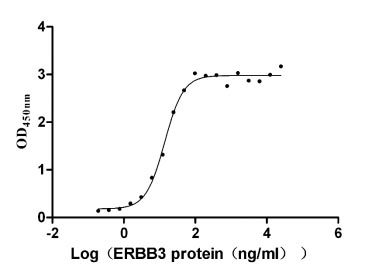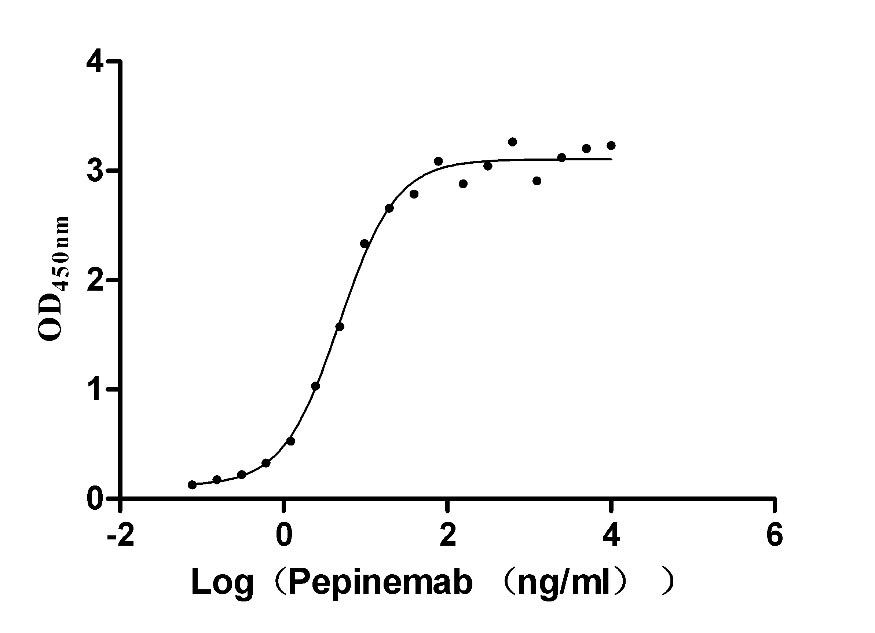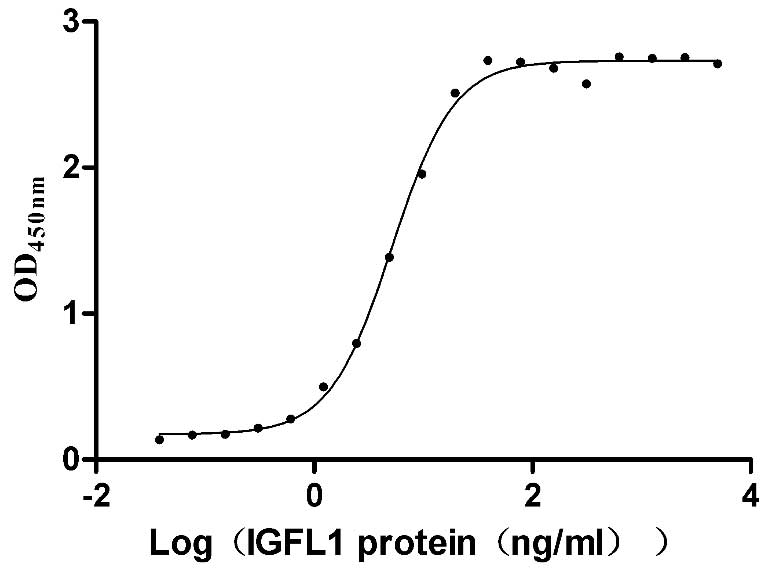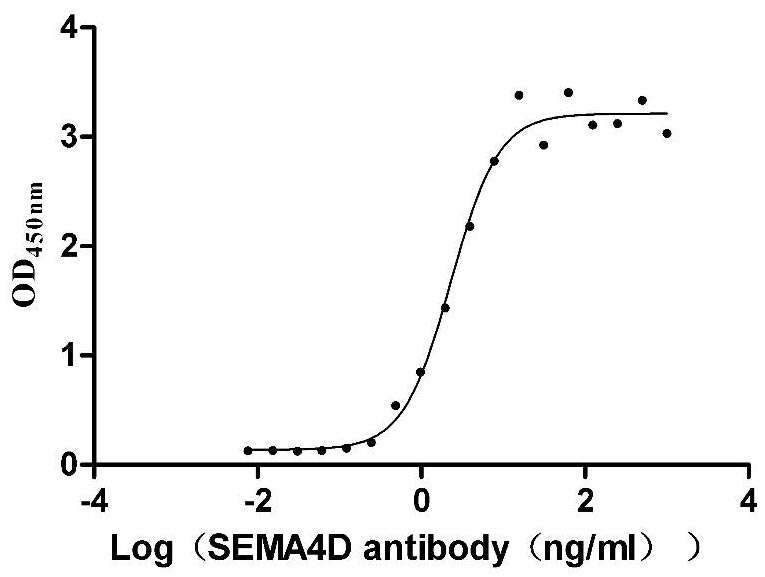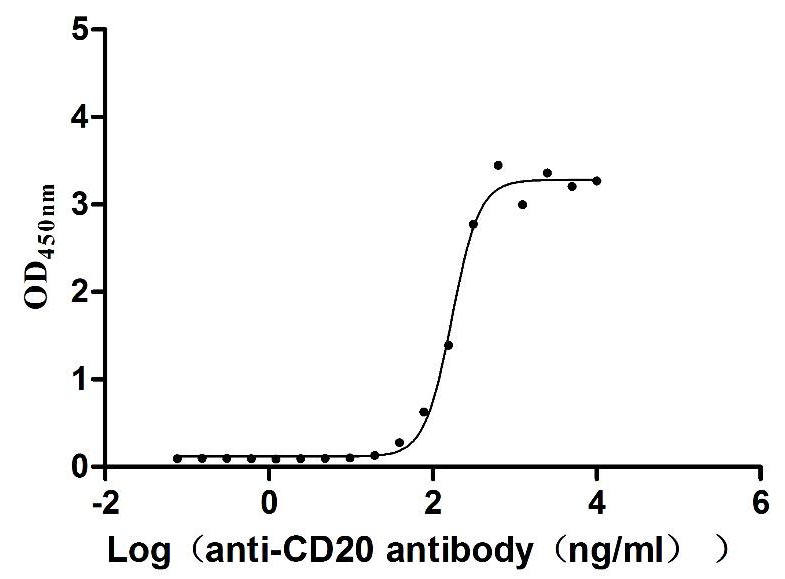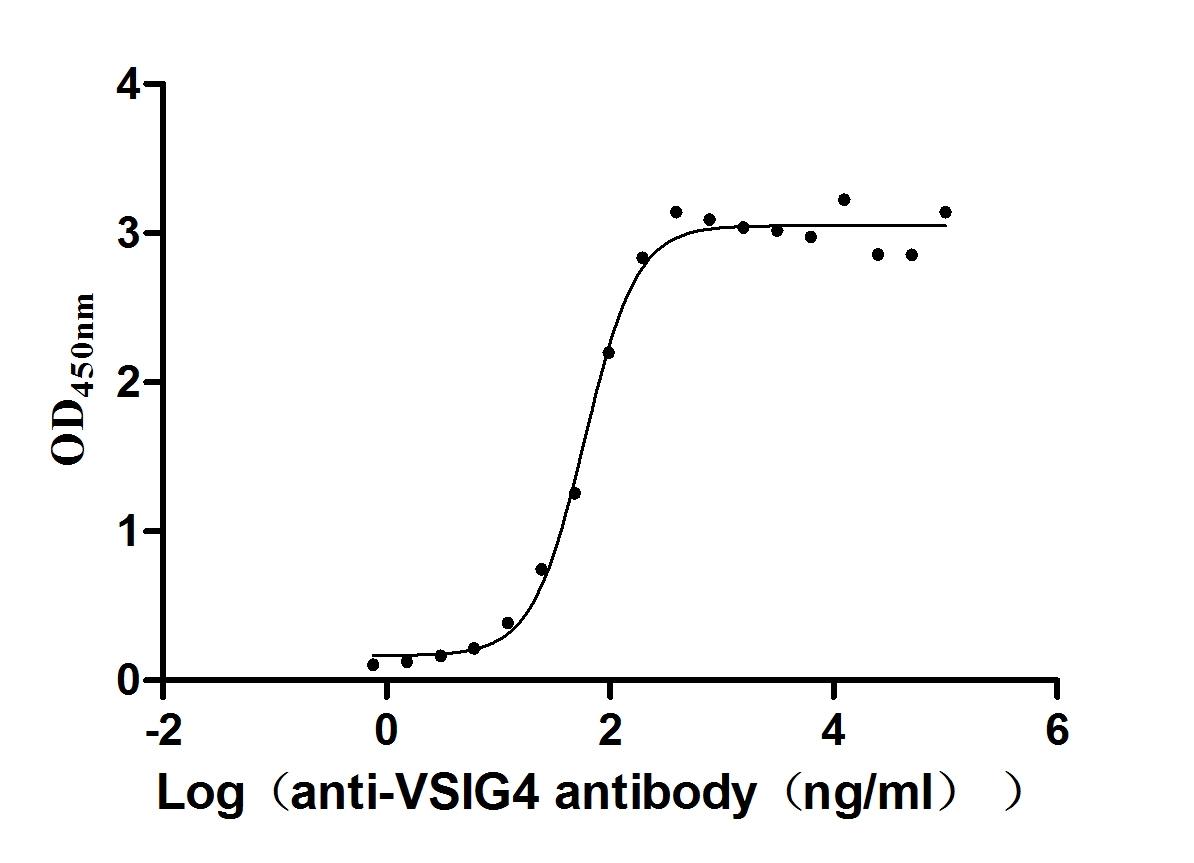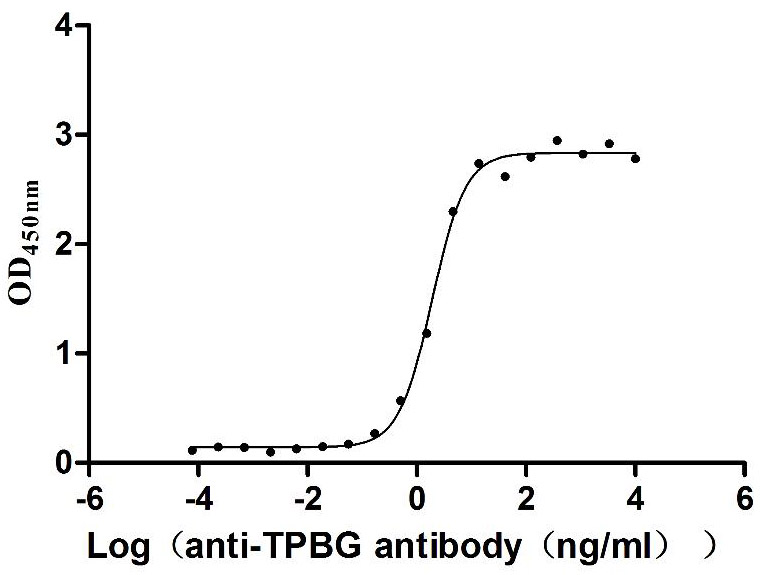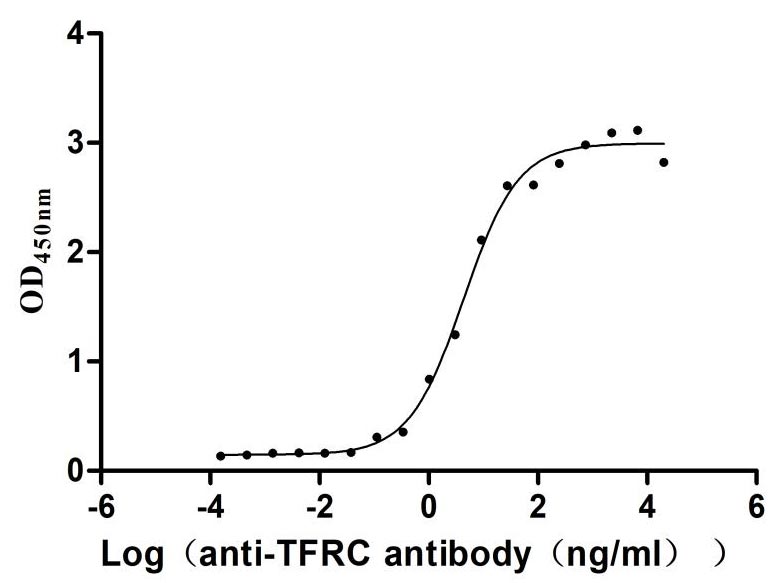Recombinant Mouse Glycogen synthase kinase-3 beta (Gsk3b)
-
货号:CSB-YP892998MO
-
规格:
-
来源:Yeast
-
其他:
-
货号:CSB-EP892998MO
-
规格:
-
来源:E.coli
-
其他:
-
货号:CSB-EP892998MO-B
-
规格:
-
来源:E.coli
-
共轭:Avi-tag Biotinylated
E. coli biotin ligase (BirA) is highly specific in covalently attaching biotin to the 15 amino acid AviTag peptide. This recombinant protein was biotinylated in vivo by AviTag-BirA technology, which method is BriA catalyzes amide linkage between the biotin and the specific lysine of the AviTag.
-
其他:
-
货号:CSB-BP892998MO
-
规格:
-
来源:Baculovirus
-
其他:
-
货号:CSB-MP892998MO
-
规格:
-
来源:Mammalian cell
-
其他:
产品详情
-
纯度:>85% (SDS-PAGE)
-
基因名:
-
Uniprot No.:
-
别名:Gsk3b; Glycogen synthase kinase-3 beta; GSK-3 beta; EC 2.7.11.26; Serine/threonine-protein kinase GSK3B; EC 2.7.11.1
-
种属:Mus musculus (Mouse)
-
蛋白长度:full length protein
-
表达区域:1-420
-
氨基酸序列MSGRPRTTSF AESCKPVQQP SAFGSMKVSR DKDGSKVTTV VATPGQGPDR PQEVSYTDTK VIGNGSFGVV YQAKLCDSGE LVAIKKVLQD KRFKNRELQI MRKLDHCNIV RLRYFFYSSG EKKDEVYLNL VLDYVPETVY RVARHYSRAK QTLPVIYVKL YMYQLFRSLA YIHSFGICHR DIKPQNLLLD PDTAVLKLCD FGSAKQLVRG EPNVSYICSR YYRAPELIFG ATDYTSSIDV WSAGCVLAEL LLGQPIFPGD SGVDQLVEII KVLGTPTREQ IREMNPNYTE FKFPQIKAHP WTKVFRPRTP PEAIALCSRL LEYTPTARLT PLEACAHSFF DELRDPNVKL PNGRDTPALF NFTTQELSSN PPLATILIPP HARIQAAASP PANATAASDT NAGDRGQTNN AASASASNST
-
蛋白标签:Tag type will be determined during the manufacturing process.
The tag type will be determined during production process. If you have specified tag type, please tell us and we will develop the specified tag preferentially. -
产品提供形式:Lyophilized powder
Note: We will preferentially ship the format that we have in stock, however, if you have any special requirement for the format, please remark your requirement when placing the order, we will prepare according to your demand. -
复溶:We recommend that this vial be briefly centrifuged prior to opening to bring the contents to the bottom. Please reconstitute protein in deionized sterile water to a concentration of 0.1-1.0 mg/mL.We recommend to add 5-50% of glycerol (final concentration) and aliquot for long-term storage at -20℃/-80℃. Our default final concentration of glycerol is 50%. Customers could use it as reference.
-
储存条件:Store at -20°C/-80°C upon receipt, aliquoting is necessary for mutiple use. Avoid repeated freeze-thaw cycles.
-
保质期:The shelf life is related to many factors, storage state, buffer ingredients, storage temperature and the stability of the protein itself.
Generally, the shelf life of liquid form is 6 months at -20°C/-80°C. The shelf life of lyophilized form is 12 months at -20°C/-80°C. -
货期:Delivery time may differ from different purchasing way or location, please kindly consult your local distributors for specific delivery time.Note: All of our proteins are default shipped with normal blue ice packs, if you request to ship with dry ice, please communicate with us in advance and extra fees will be charged.
-
注意事项:Repeated freezing and thawing is not recommended. Store working aliquots at 4°C for up to one week.
-
Datasheet :Please contact us to get it.
靶点详情
-
功能:Constitutively active protein kinase that acts as a negative regulator in the hormonal control of glucose homeostasis, Wnt signaling and regulation of transcription factors and microtubules, by phosphorylating and inactivating glycogen synthase (GYS1 or GYS2), EIF2B, CTNNB1/beta-catenin, APC, AXIN1, DPYSL2/CRMP2, JUN, NFATC1/NFATC, MAPT/TAU and MACF1. Requires primed phosphorylation of the majority of its substrates. In skeletal muscle, contributes to insulin regulation of glycogen synthesis by phosphorylating and inhibiting GYS1 activity and hence glycogen synthesis. May also mediate the development of insulin resistance by regulating activation of transcription factors. Regulates protein synthesis by controlling the activity of initiation factor 2B (EIF2BE/EIF2B5) in the same manner as glycogen synthase. In Wnt signaling, GSK3B forms a multimeric complex with APC, AXIN1 and CTNNB1/beta-catenin and phosphorylates the N-terminus of CTNNB1 leading to its degradation mediated by ubiquitin/proteasomes. Phosphorylates JUN at sites proximal to its DNA-binding domain, thereby reducing its affinity for DNA. Phosphorylates NFATC1/NFATC on conserved serine residues promoting NFATC1/NFATC nuclear export, shutting off NFATC1/NFATC gene regulation, and thereby opposing the action of calcineurin. Phosphorylates MAPT/TAU on 'Thr-548', decreasing significantly MAPT/TAU ability to bind and stabilize microtubules. Plays an important role in ERBB2-dependent stabilization of microtubules at the cell cortex. Phosphorylates MACF1, inhibiting its binding to microtubules which is critical for its role in bulge stem cell migration and skin wound repair. Probably regulates NF-kappa-B (NFKB1) at the transcriptional level and is required for the NF-kappa-B-mediated anti-apoptotic response to TNF-alpha (TNF/TNFA). Negatively regulates replication in pancreatic beta-cells, resulting in apoptosis, loss of beta-cells. Through phosphorylation of the anti-apoptotic protein MCL1, may control cell apoptosis in response to growth factors deprivation. Phosphorylates MUC1 in breast cancer cells, decreasing the interaction of MUC1 with CTNNB1/beta-catenin. Is necessary for the establishment of neuronal polarity and axon outgrowth. Phosphorylates MARK2, leading to inhibit its activity. Phosphorylates SIK1 at 'Thr-182', leading to sustain its activity. Phosphorylates ZC3HAV1 which enhances its antiviral activity. Phosphorylates SFPQ at 'Thr-679' upon T-cell activation. Phosphorylates SNAI1, leading to its BTRC-triggered ubiquitination and proteasomal degradation. Phosphorylates NR1D1 st 'Ser-55' and 'Ser-59' and stabilizes it by protecting it from proteasomal degradation. Regulates the circadian clock via phosphorylation of the major clock components including ARNTL/BMAL1, CLOCK and PER2. Phosphorylates CLOCK AT 'Ser-427' and targets it for proteasomal degradation. Phosphorylates ARNTL/BMAL1 at 'Ser-17' and 'Ser-21' and primes it for ubiquitination and proteasomal degradation. Phosphorylates OGT at 'Ser-3' or 'Ser-4' which positively regulates its activity. Regulates the circadian rhythmicity of hippocampal long-term potentiation and ARNTL/BMLA1 and PER2 expression. Acts as a regulator of autophagy by mediating phosphorylation of KAT5/TIP60 under starvation conditions, leading to activate KAT5/TIP60 acetyltransferase activity and promote acetylation of key autophagy regulators, such as ULK1 and RUBCNL/Pacer. Negatively regulates extrinsic apoptotic signaling pathway via death domain receptors. Promotes the formation of an anti-apoptotic complex, made of DDX3X, BRIC2 and GSK3B, at death receptors, including TNFRSF10B. The anti-apoptotic function is most effective with weak apoptotic signals and can be overcome by stronger stimulation.
-
基因功能参考文献:
- Inactivation of Gsk-3beta stimulates activation of Pgc-1 signaling and mitochondrial biogenesis during myogenic differentiation and reloading of the skeletal musculature. PMID: 29883716
- Inactivation of GSK-3beta up-regulates skeletal muscle mitochondrial metabolism and increases expression levels of PGC-1 signaling constituents. In vivo, GSK-3beta KO protects against inactivity-induced reductions in muscle metabolic gene expression. PMID: 28943449
- Data suggest that Mps One binder 1 (MOB1) acts as a necessary regulator in PTEN-GSK3beta axis that controls neurite outgrowth after spinal cord injury (SCI). PMID: 30069702
- Increased PKC activity and altered GSK3B/NMDAR function drive behavior cycling in HINT1-deficient mice. PMID: 28240305
- these results suggest that Nrf2 plays a central role in the prevention of Ang II-induced cardiomyopathy, and SFN prevents Ang II-induced cardiomyopathy partially via the Akt/GSK-3beta/Fyn-mediated Nrf2 activation. PMID: 29353218
- High Gsk3b expression is associated with cardiac hypertrophy. PMID: 30125581
- Data show that glycogen synthase kinase 3 (GSK3) activity regulates sodium current (INaP), and INaP exhibits a day/night difference in peak magnitude that is regulated by GSK3. PMID: 27841351
- Gsk3beta is highly expressed and phosphorylated in the brain of chronic stress mouse. Inhibition of Gsk3beta lead to decreased depression like symptoms which is manifested in open field test, tail-suspension test, forced-swim test and novelty suppressed feeding test. beta-catenin is attenuated, and its target genes Cyclin D1 and c-Myc are down-regulated. Gsk3beta can inhibit the Erk-Creb-BDNF signaling. PMID: 29036833
- Our results suggest that GSK-3beta inhibitor dose may determine the summation effect of the intrinsic and extrinsic apoptosis pathways. The extrinsic apoptosis pathway might be another therapeutic target for developing a potential GSK-3beta inhibitor. PMID: 29082245
- differential regulation of selected GSK3 targets can markedly improve the regenerative outcome and could therefore provide treatment strategies for the injured CNS PMID: 28630333
- the GSK-3beta/beta-catenin signal pathway mediates the adverse effects of Ti particles on osteoblast differentiation and bone destruction PMID: 28617442
- abnormal PKC-epsilon/PKC-delta ratio promotes the activation of Drp1 signalling, caspase cascades and GSK-3beta-dependent mPTP opening PMID: 28266127
- In inflamed experimental autoimmune encephalomyelitis (EAE) spinal cord, study found a significant increased number of IGF-I expressing neurons versus a reduced number of IGFBP-1 positive neurons. Moreover, while nearly all IGF-I neurons expressed GSK3beta, some expressed it more intensely. PMID: 28617951
- GSK3beta is required for CD4(+) T cell homeostasis.Gimap5 is a critical inhibitor of GSK3-beta in the CD4+ T cells. PMID: 29382851
- that laforin and malin are novel regulators of mitochondrial quality control pathway and that the mitochondrial dysfunction resulting from the increased Drp1 levels could underlie neuropathology in Lafora disease PMID: 28063983
- The results of this study support the model that circadian rhythmicity of hippocampal GSK3beta activation state regulates day/night differences in molecular clock periodicity and a major form of synaptic plasticity (LTP). PMID: 28556462
- Its activation mediates tau phosphorylation and impairs memory in diabetes. PMID: 28609678
- This study demonstrates the neuroprotective effect of TSG on APP expression, suggesting that TSG may be beneficial for AD prevention and treatment. PMID: 29129695
- GSK3 catalyzes two previously unreported phosphorylation events at Ser(476) and Ser(480) of Cbl-b. The PI3K-PKB-GSK-3 pathway is a novel regulatory axis that is important for controlling the decision between T cell activation and tolerance via Cbl-b. PMID: 29109121
- GSK-3 plays a significant role in astrocyte development and behavioral control in mice. PMID: 26179612
- Study of GSK3b inhibitors SB415286 and SB216763 to improve osteoblastic differentiation on microstructured titanium. PMID: 28952290
- identify GSK-3beta as a newly identified target for amelioration of empyema-related pleural fibrosis and provide a strong rationale for further investigation of GSK-3beta signaling in the control of MesoMT and pleural injury PMID: 29073967
- it is suggested that Notch-1, NF-kappaB/p65 and GSK-3beta operate in synergy to inhibit microglia activation PMID: 29049420
- Data suggest that, in embryonic stem cells, Gsk3b/Gsk3a phosphorylate splicing factors (Rbm8a, Srsf9, and Psf) and nucleolar proteins (Npm1 and Phf6); Gsk3b/Gsk3a are key to alternative splicing of close to 190 genes. (Gsk3 = glycogen synthase kinase-3; Rbm8a = RNA binding motif protein 8a; Srsf9 = splicing factor, arginine-serine-rich 9; Psf = replication protein Psf; Npm1 = nucleophosmin 1; Phf6 = PHD finger protein 6) PMID: 28916722
- Tideglusib significantly reduced cerebral infarct volume at both 24h and 7days after HI injury. Tideglusib also increased phosphorylated GSK-3beta(Ser9) and Akt(Ser473) PMID: 27378458
- Therefore our study identifies a compartmentalized PtdIns(3,4,5)P3/AKT/GSK3beta signaling axis at cilia in SHH-dependent medulloblastoma that is regulated by INPP5E to maintain tumor cell cilia, promote SHH signaling and thereby medulloblastoma progression. PMID: 28650469
- B-cell receptor controls fitness of MYC-driven lymphoma cells via GSK3beta inhibition PMID: 28562582
- These findings suggest that protein tyrosine phosphatase SHP-1 may act as a positive regulator of osteoblast differentiation through direct association with and dephosphorylation of GSK3beta. PMID: 27614023
- CREB was found to bind to GSK3beta promoter and essential for cAMP-mediated regulation of GSK3beta. PMID: 27190311
- GSK-3beta participates in early pancreatitis-induced acinar-to-ductal metaplasia and the progression towards pre-malignant pancreatic intraepithelial neoplasia. PMID: 28639695
- These observations demonstrate that oxidative stress destabilizes PRMT4 via GSK-3beta signaling to impede lung epithelial cell migration that may hinder the lung repair and regeneration process. PMID: 28637674
- The activation of brain GSK-3beta expression is increased in an animal model of depressive syndrome. PMID: 27478647
- Findings suggest that atorvastatin attenuates diabetes-associated renal injury by reducing reactive oxygen species (ROS) generation, RhoA activity and normalizing Akt/GSK3beta signaling pathways. PMID: 27649495
- Tregs ameliorated ICH-induced inflammatory injury by modulating microglia/macrophage polarization toward the M2 phenotype through the IL-10/GSK3beta/PTEN axis PMID: 27174997
- GSK-3beta(+/-) mouse hearts exhibited more severe hypertrophy, which was characterized by accelerated interstitial fibrosis, than wild-type mouse hearts after transverse aortic constriction, suggesting that reduced GSK-3beta activity aggravates pressure-induced left ventricular remodeling. PMID: 27628899
- findings indicate a previously unknown interaction between GSK3beta and ELAV-1 during acute respiratory distress syndrome , and suggest the inhibition of the ELAV-1- GSK3beta pathways as a novel acute respiratory distress syndrome treatment approach. PMID: 28196122
- data suggest GSK3b and mTOR pathways modulate this ATXN1 function in spinocerebellar ataxia type-1 (SCA1)pathogenesis that could be targeted therapeutically prior to the onset of disease symptoms in SCA1 and other pathologies involving dysregulation of ATXN1 functions. PMID: 27466200
- GSK3 is regulated through mechanisms independent of N-terminal serine phosphorylation in order for beta-catenin to be stabilized. PMID: 27284979
- This study suggests that the inhibition of GSK-3beta is cardioprotective in familial dilated cardiomyopathy associated with DeltaK210 cardiac troponin T mutation. PMID: 27106044
- Data show that the fine control of excitatory transmission by glycogen synthase kinase 3 requires recruitment of dopamine D2-receptors and depends on the presence of serotonin 5-HT1A-receptors. PMID: 27678414
- this study demonstrated a critical role for Gsk3 in the maintenance of the quiescent state of naive recirculating B cells and in the regulation of germinal center B cell growth and proliferation in response to nutrient stress and oxygen deb PMID: 28114292
- Hepatocyte growth factor prevents high glucose-induced podocyte injury via an autophagy-promoting mechanism, which involves GSK3beta inhibition. PMID: 27526674
- PAR2/GSK3beta is a novel pathway that plays a critical role in the regulation of stem/progenitor cell survival and proliferation in normal colon crypts and colon cancer. PMID: 27313176
- The data are consistent with the hypothesis that P2X7R contributes to alveolar epithelial barrier function through effects on GSK-3beta. PMID: 27663455
- GSK3B-MCL1 signaling to regulate axonal autophagy might be important for the successful completion of Wallerian degeneration. PMID: 28053206
- that nuclear GSK3beta- and USP22-mediated KDM1A stabilization is essential for glioblastoma tumorigenesis PMID: 27501329
- These results point to a new role for NRP2 in the positioning of neurons during adult hippocampal neurogenesis, acting via the GSK3beta signaling pathway. PMID: 27687730
- These findings reveal a novel BVRA-GSKbeta-PPARalpha axis that regulates hepatic lipid metabolism and may provide unique targets for the treatment of non-alcoholic fatty liver disease. PMID: 27738106
- Suggest Aster spathulifolius extract reduces melanin synthesis by regulating melanocyte MAPK/ERK and AKT/GSK3beta signalling. PMID: 26993057
- the cross-talk between canonical and non-canonical signaling pathways of Wnt3A, which induces GSK-3beta phosphorylation and beta-catenin accumulation through RhoA and ROCK activation. PMID: 27575935
显示更多
收起更多
-
亚细胞定位:Cytoplasm. Nucleus. Cell membrane.
-
蛋白家族:Protein kinase superfamily, CMGC Ser/Thr protein kinase family, GSK-3 subfamily
-
数据库链接:
KEGG: mmu:56637
STRING: 10090.ENSMUSP00000023507
UniGene: Mm.394930
Most popular with customers
-
Recombinant Human Receptor tyrosine-protein kinase erbB-3 (ERBB3), partial (Active)
Express system: Mammalian cell
Species: Homo sapiens (Human)
-
Recombinant Human Semaphorin-4D (SEMA4D), partial (Active)
Express system: Mammalian cell
Species: Homo sapiens (Human)
-
Recombinant Human IGF-like family receptor 1 (IGFLR1), partial (Active)
Express system: Mammalian cell
Species: Homo sapiens (Human)
-
Recombinant Macaca mulatta Semaphorin-4D isoform 1 (SEMA4D), partial (Active)
Express system: Mammalian cell
Species: Macaca mulatta (Rhesus macaque)
-
Recombinant Dog B-lymphocyte antigen CD20 (MS4A1)-VLPs (Active)
Express system: Mammalian cell
Species: Canis lupus familiaris (Dog) (Canis familiaris)
-
Recombinant Human V-set and immunoglobulin domain-containing protein 4 (VSIG4), partial (Active)
Express system: Mammalian cell
Species: Homo sapiens (Human)
-
Recombinant Macaca fascicularis Trophoblast glycoprotein (TPBG), partial (Active)
Express system: Mammalian cell
Species: Macaca fascicularis (Crab-eating macaque) (Cynomolgus monkey)
-
Recombinant Human Transferrin receptor protein 1 (TFRC), partial (Active)
Express system: Mammalian cell
Species: Homo sapiens (Human)


